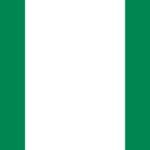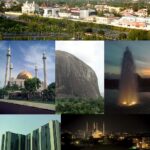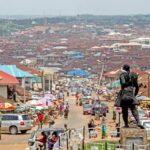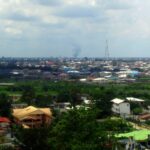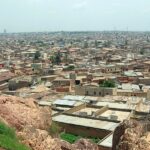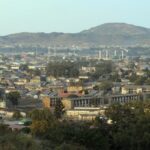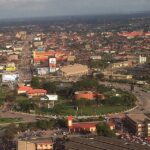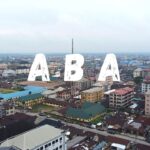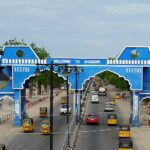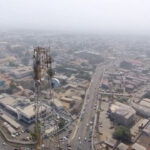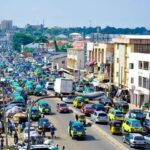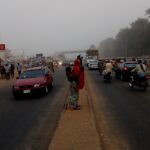Lagos
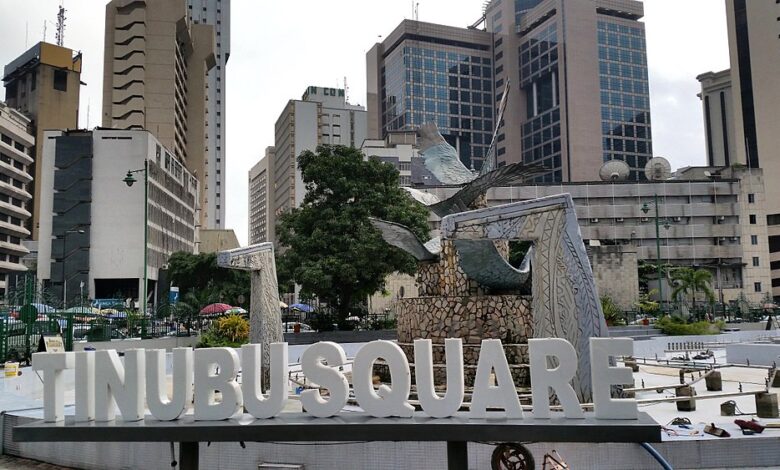
Welcome to Lagos, a city that pulsates with life, energy, and rich history. Lagos is the largest city in Nigeria and one of the most populous urban centers in Africa. This bustling metropolis is a melting pot of cultures, offering a unique blend of tradition and modernity.
Lagos, also known as Lagos City, holds the distinction of being Nigeria’s most populous city. In 2015, it was estimated to have a population of 21 million, but by 2023, that number had risen to over 26 million. The broader Lagos metropolitan area boasted a population of around 30 million during the same period. Notably, Lagos stands as Africa’s most densely populated urban region.
Until December 1991, Lagos served as Nigeria’s national capital until the government decided to relocate the capital to Abuja, situated in the country’s central region. Despite this change, Lagos remains a vital African financial center and continues to be the economic hub not only of Lagos State but of Nigeria as a whole.
Lagos enjoys a multitude of accolades, often described as the cultural, financial, and entertainment capital of Africa. Its influence extends across various domains, including commerce, entertainment, technology, education, politics, tourism, art, and fashion. It is no wonder that Lagos ranks among the top ten fastest-growing cities and urban areas in the world.
Economically, Lagos is formidable, boasting the fourth-highest GDP in Africa and hosting one of the largest and busiest seaports on the continent. Moreover, the city serves as a prominent center for education and culture in Sub-Saharan Africa.
Due to its considerable urban population and the high volume of port traffic, Lagos qualifies as a Medium-Port Megacity, playing a crucial role in regional and global trade and commerce.
City profile [Wikipedia]
| Coordinates: 6.455027°N 3.384082°E | |
| Country | |
|---|---|
| State | Lagos |
| LGA(s)[note 1] |
List of LGAs
|
| Settled | 15th century |
| Founded by | Awori tribe of the Yoruba[5] |
| Government
|
|
| • Governor of Lagos | Babajide Sanwo-Olu |
| • Deputy Governor | Femi Hamzat |
| • Supreme Judge | Kazeem Alogba |
| Area | |
| • Metropolis | 1,171.28 km2 (452.23 sq mi) |
| • Land | 999.6 km2 (385.9 sq mi) |
| • Water | 171.68 km2 (66.29 sq mi) |
| • Urban
|
907 km2 (350 sq mi) |
| • Metro
|
2,706.7 km2 (1,045.1 sq mi) |
| Elevation
|
41 m (135 ft) |
| Population
(2006 census)[note 1]
|
|
| • Metropolis | 8,048,430 |
| • Estimate | 16,437,435 |
| • Rank | 1st |
| • Density | 6,871/km2 (17,800/sq mi) |
| • Urban
|
16,637,000[7] |
| • Urban density | 14,469/km2 (37,470/sq mi) |
| • Metro
|
21,000,000 (estimated)[6] |
| • Metro density | 7,759/km2 (20,100/sq mi) |
| Demonym | Lagosian |
| Time zone | UTC+1 |
| Area code | 010[8] |
| Climate | Aw |
|
|
History
Lagos was originally a Yoruba settlement called Eko. It was founded by the Awori people in the 15th century. The Portuguese arrived in Lagos in the 16th century, and they named it “Lagos” after the Portuguese word for “lake”. Lagos became a major trading port for the Portuguese, and it was also a center for the transatlantic slave trade.
In the 19th century, Lagos became a British colony. It was granted independence from Britain in 1960, and became the capital of Nigeria. In 1991, the capital of Nigeria was moved to Abuja, but Lagos remains the economic and financial hub of the country.
Geography of Lagos
Lagos is located in southwestern Nigeria, on the coast of the Atlantic Ocean. It is a coastal city, and it is also surrounded by lagoons. The city is divided into two main parts: Lagos Island and the mainland. Lagos Island is the oldest part of the city, and it is home to the financial district and many of the city’s historical landmarks. The mainland is the newer part of the city, and it is home to the majority of the city’s population.
Lagos experiences a tropical savanna climate with wet and dry seasons. The wet season starts in March and ends in October, while the dry season starts in November and ends in February. The wettest month is June with precipitation total 315.5 mm or 12.42 in, while the driest month is January with precipitation total 13.2 mm or 0.52 in.
The city is also facing the threat of sea level rise due to climate change. A 2019 paper published in PLOS One estimated that under Representative Concentration Pathway 4.5, a “moderate” scenario of climate change where global warming reaches ~2.5–3 °C (4.5–5.4 °F) by 2100, the climate of Lagos in the year 2050 would most closely resemble the current climate of Panama City. The annual temperature would increase by 1.6 °C (2.9 °F) and the temperature of the warmest month by 1.5 °C (2.7 °F), while the temperature of the coldest month would be 2.9 °C (5.2 °F) higher. According to Climate Action Tracker, the current warming trajectory appears consistent with 2.7 °C (4.9 °F), which closely matches RCP 4.5.
Moreover, according to the 2022 IPCC Sixth Assessment Report, Lagos is one of 12 major African cities (Abidjan, Alexandria, Algiers, Cape Town, Casablanca, Dakar, Dar es Salaam, Durban, Lagos, Lomé, Luanda and Maputo) that would be the most severely affected by sea level rise. It estimates that they would collectively sustain cumulative damage of USD 65 billion under RCP 4.5 and USD 86.5 billion in the high-emission scenario RCP 8.5 by the year 2050. Additionally RCP 8.5 combined with the hypothetical impact from marine ice sheet instability at high levels of warming would involve up to 137.5 billion USD in damage, while the additional accounting for the “low-probability, high-damage events” may increase aggregate risks to USD 187 billion for the “moderate” RCP4.5, USD 206 billion for RCP8.5 and USD 397 billion under the high-end ice sheet instability scenario. Since sea level rise would continue for about 10,000 years under every scenario of climate change, future costs of sea level rise would only increase, especially without adaptation measures.
Education
Lagos has a well-developed education system that follows the 6-3-3-4 model practiced across the country and the Economic Community of West African States. The system includes Primary, Junior Secondary School (JSS), Senior Secondary School (SSS), and university levels. The focus now lies on providing basic education, with particular emphasis on the first nine years.
Nigeria’s education landscape consists of both state and federally funded schools. Among them are several federally funded boarding schools like Federal Government College Odogbolu (FGCOdogbolu), Federal Government Girls’ College Sagamu (FGGCSagamu), and Federal Government College Kano (FGCKano). Lagos also hosts its own federally funded high schools, such as Federal Government College Ijanikin (FGC Lagos), King’s College Lagos, and Queen’s College Lagos.
In addition to traditional educational institutions, Lagos boasts various postsecondary schools, universities, and vocational institutions, both government-operated and private. Some notable vocational schools include the Institute for Industrial Technology (IIT), which caters to underprivileged male youth using the Dual Training System.
Polytechnics are an integral part of higher education, and Yaba College of Technology (YABATECH) holds the distinction of being Nigeria’s first higher educational institution. Lagos State Polytechnic, Lagos City Polytechnic, and other private polytechnics also offer diverse courses.
As for universities, Lagos houses the prestigious University of Lagos (UNILAG) and Lagos State University (LASU) – a multi-campus institution owned by the state government. Pan-Atlantic University (formerly Pan-African University) provides specialized courses in business, media, communication, and entrepreneurship. The National Open University of Nigeria, located in Lagos, is the country’s first open university.
Other institutions like Caleb University, Lagos State College of Health Technology (LASCOHET), Lagos State University College of Medicine (LASUCOM), and College of Medicine, University of Lagos (CMUL) further enrich the city’s educational landscape.
With a wide array of educational opportunities, Lagos remains a thriving hub for learning and academic excellence.
Economy
Lagos is a major economic center in Nigeria, generating around 10% of the country’s GDP. The city is home to the country’s leading port, as well as a thriving entertainment industry and media sector. Lagos is also home to the Lekki Free Trade Zone, which is expected to create thousands of jobs. The city is also a major center for the pharmaceutical industry in Africa.
Here are some of the key economic sectors in Lagos:
- Ports: Lagos is home to the Port of Lagos, which is one of the largest and busiest ports in Africa. The port handles a wide variety of cargo, including containerized cargo, bulk cargo, and liquid cargo.
- Entertainment industry: Lagos is the center of the West African film, music, and TV industries. The city is home to a number of film studios, as well as a thriving music scene.
- Media: Lagos is home to a number of media outlets, including newspapers, magazines, radio stations, and TV stations. The city is also a major center for the internet and telecommunications industries.
- Free Trade Zone: The Lekki Free Trade Zone is a special economic zone located in Lagos. The zone is designed to attract foreign investment and create jobs.
- Pharmaceutical industry: Lagos is a major center for the pharmaceutical industry in Africa. The city is home to a number of pharmaceutical companies, as well as a number of research and development facilities.
Lagos is a rapidly growing city, and its economy is expected to continue to grow in the years to come. The city is well-positioned to take advantage of the opportunities presented by the African Continental Free Trade Area (AfCFTA).
Culture
Lagos is a cultural center of Nigeria. It is a port city with a strong Western influence. The city is home to people from all Nigerian ethnic groups, with the Yoruba predominating. Lagos is a dynamic center of the music and film industries in Nigeria.
Some of the most notable cultural attractions in Lagos include:
- The National Arts Theatre
- The Lekki-Ikoji Link Bridge
- The Cathedral Church of Christ
- The Synagogue Church of all Nations
- The Nike Art Gallery
- The Red Door Gallery
- The Ovuomaroro Studio and Gallery
- The Alexis Galleries
- The National Museum
- The John K. Randle Centre
- The Kalakuta Republic
- The Mindscape Childrens Museum
- The Lagos Carnival
This city is also known for its vibrant music and film scenes. Some of the most famous dishes in Lagos include indigenous delicacies such as eba and egusi; amala and ewedu; jollof (the go-to party dish); ofada rice; plantains (locally called dodo); beans; suya (spicy shish kebab or spiced roasted beef), which is consumed in local clubs and bars with a bottle of cold beer; and eba, made from cassava and eaten with soups prepared with vegetables and mixture of spices and herbs.
Lagos is a fascinating city with a rich culture and history. There is something for everyone in Lagos, from art and culture to music and film.
Sports
Association football, commonly known as soccer, holds the title of being the most popular sport in Lagos. Notable football clubs in Lagos include Bridge Boys F.C., MFM F.C., and First Bank, all of which compete in the Nigeria National League, the second tier of Nigerian football.
In the past, the Nigeria national football team, also called the Super Eagles, used to primarily play their home games in Lagos at the National Stadium in Surulere. Later on, there was a shift, and matches were held at the then New Abuja National Stadium in Abuja for a period. However, currently, most games are played at the modern Godswill Akpabio International Stadium in Uyo, which serves as the default home ground for the Super Eagles. It has become the preferred venue for their matches.
Lagos also has a historical connection to sports, having hosted the 2nd All-African Games back in 1973.

